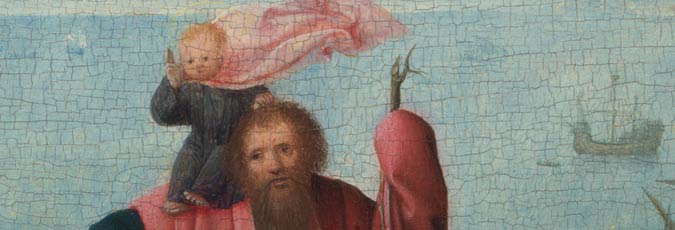The History Of Saint Christopher

In this age of world travel, the St Christopher is known for bringing luck to travellers and symbolising good fortune for all those undertaking journeys.
Saint Christopher is the patron saint of travellers – but did you know he is also the patron saint of drivers, sailors, storms and gardeners, and is also said to protect against the bubonic plague and even toothache.
He is one of the saints from a group called the “Fourteen Holy Helpers”. These 14 saints were thought to help fight a number of different diseases, and were often called on during the Black Death in Europe (1346-1353).
Saint Christopher – the patron saint of travellers and drivers
Saint Christopher is most widely recognised as the patron saint of travellers. Many people would never dream of going on a trip without wearing a St Christopher or carrying some kind of lucky talisman with them.
The story behind the medallion comes from the tale of Saint Christopher helping a child across a river. A child approached Saint Christopher and asked to be helped across. The saint obliged – but as he crossed, the river rose and the child's weight grew and grew until he became extremely heavy. It was only with great determination that Saint Christopher was able to ford the river and safely deliver the child to the other side.
When they reached the other side, Saint Christopher asked the child why he was so heavy. The child explained that He was Christ – and when Saint Christopher carried Him, he also carried the weight of the whole world on his shoulders. The child then vanished.
Stories say Saint Christopher travelled widely after this experience, and evangelised thousands of people. Arriving in Lycia in ancient Asia Minor he witnessed Christians being martyred, and was captured and ordered to offer a sacrifice to the Emperor. He refused, so the Emperor attempted to persuade him with the temptation of money and women. However, he converted the women who were sent to seduce him to Christianity.
Following this the Emperor decided to have him killed. Various attempts to assassinate him failed, but eventually he was arrested and beheaded.
The name "Christopher" means Christ-bearer – the man who carried the Christ Child across the river. Saint Christopher didn’t become popular in the Church until the 7th Century, about three centuries after his death. It was around this time that churches and monasteries began to be named after him.





